The analysis of 616 papers about the diet of the European Barn Owl Tyto alba showed that 9678 invertebrates were captured out of 3.13 million prey items (0.31%). The consumption of invertebrates strongly decreased between 1860 and 2012. The present study demonstrates that the diet of a predator changed to a large extent during the last 150 years probably due to the negative impact of human activities on biodiversity. Bats and birds are less often captured nowadays than in the past. The temporal decline in invertebrate consumption appears to be particularly strong potentially suggesting that the decrease in bat and bird consumption might be driven by the strong decline in invertebrates possibly due to the use of insecticides and other human-related changes in habitat and climate. Engineers call the discovery of insecticides the ‘golden age of insecticide research’ although a cynic might suggest that it appears that we are currently living the ‘golden age of biodiversity destruction’ because of the use of insecticides. Insects are rich in proteins and unsaturated fat as well as carotenoids, and hence a diet with fewer insects may affect the health of their predators.
Source:
ALEXANDRE ROULIN. Bird Study (2016) 63, 146–147

- Login om te reageren
